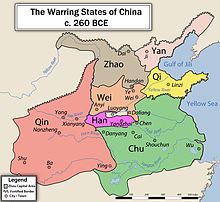This article needs additional citations for verification. (November 2024) |

The Seven Warring States or Seven Kingdoms (traditional Chinese: 戰國七雄; simplified Chinese: 战国七雄; pinyin: zhàn guó qī xióng) were the seven leading hegemonic states during the Warring States period (c. 475 to 221 BC) of Ancient China:[1]
- Han[a], defeated by Qin in 230 BCE
- Zhao (趙/赵), defeated by Qin in 228 BCE
- Wei (魏), defeated by Qin in 225 BCE
- Chu (楚), defeated by Qin in 223 BCE
- Yan (燕), defeated by Qin in 222 BCE
- Qi (齊/齐), defeated by Qin in 221 BCE
- Qin (秦)
During the Eastern Zhou dynasty, the weakened Zhou central sovereignty quickly lost control of its confederate vassal states, and the numerous autonomous states began overreaching and expanding their political ambitions via diplomacy and warfare, sparking a period of chaotic conflicts known as the Spring and Autumn period. After most of the smaller, weaker states were conquered and annexed by larger states, the geopolitical landscape eventually became dominated by seven most powerful states, and wars became increasingly pitched and violent. Over the Warring States period, many of the seven states underwent bureaucratic and military reforms in order to mobilise resources on a greater scale. This led to an intensification of warfare over the period, but also led to significant economic and cultural developments.
Of the Seven Warring States, the state of Qin grew to be the strongest and eventually conquered and successfully annexed the other six states; Han was the first to fall in 230 BCE, while Qi was the last to surrender in 221 BCE.[1] Ying Zheng, the King of Qin, created the new title of Huangdi and became China's first emperor, Qin Shi Huang. The Qin state then became the Qin dynasty, and China entered its Imperial era, which lasted over the next two millennia.
- ^ a b Lewis, Mark Edward (1999). "Warring States Political History". In Loewe, Michael; Shaughnessy, Edward Louis (eds.). The Cambridge history of ancient China: from the origins of civilization to 221 B.C. Cambridge: Cambridge university press. pp. 593–597, 641. ISBN 0521470307.
Cite error: There are <ref group=lower-alpha> tags or {{efn}} templates on this page, but the references will not show without a {{reflist|group=lower-alpha}} template or {{notelist}} template (see the help page).